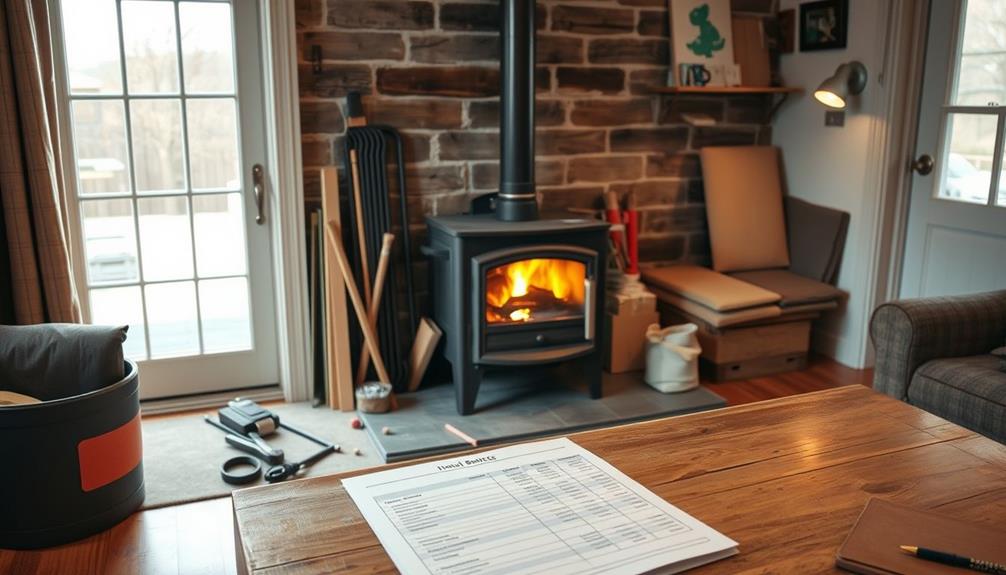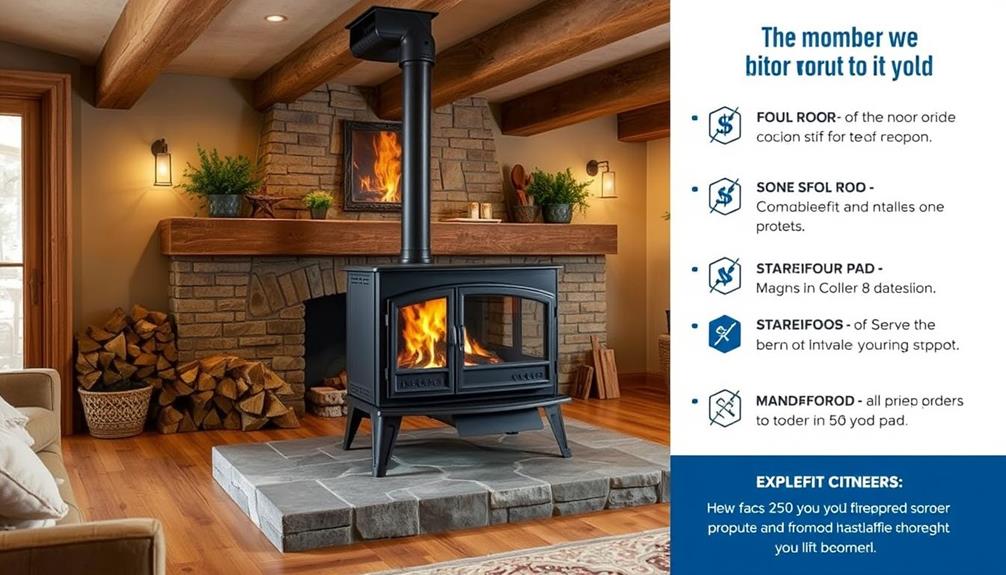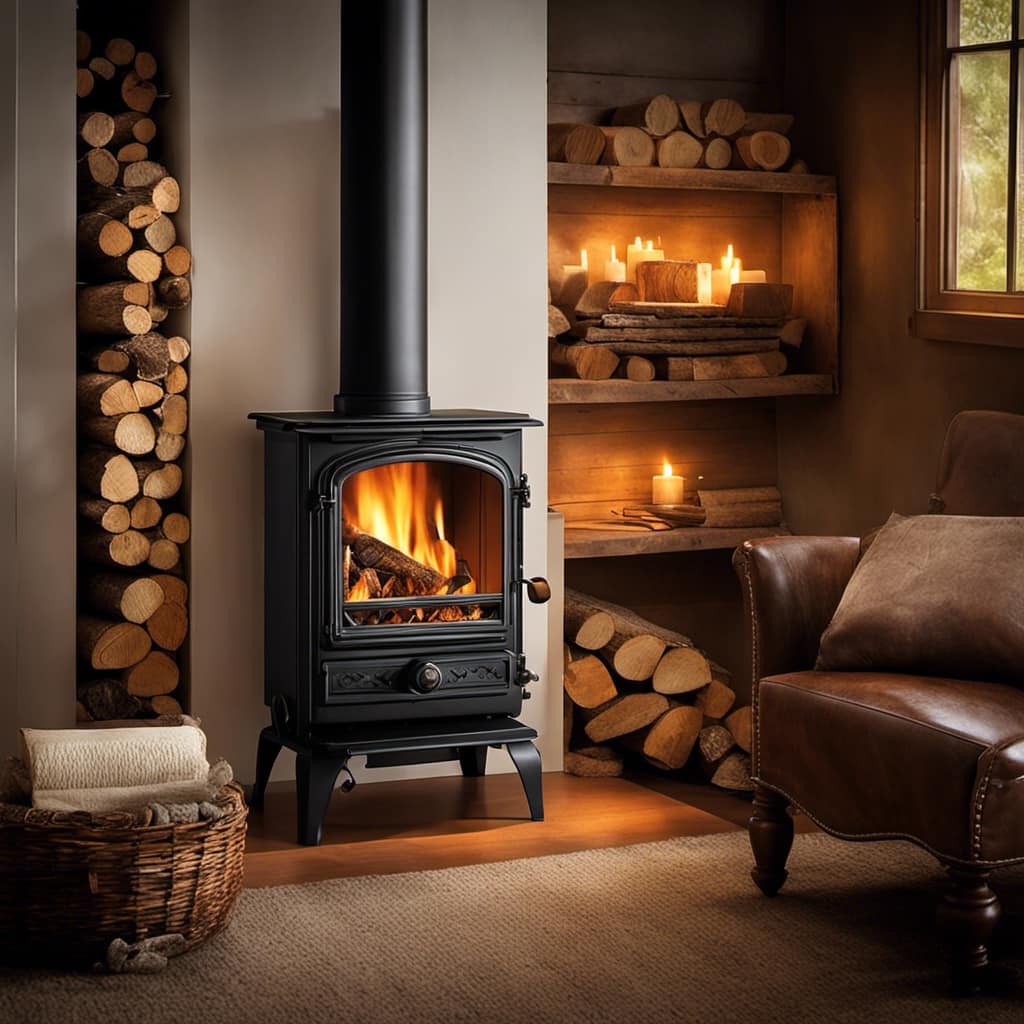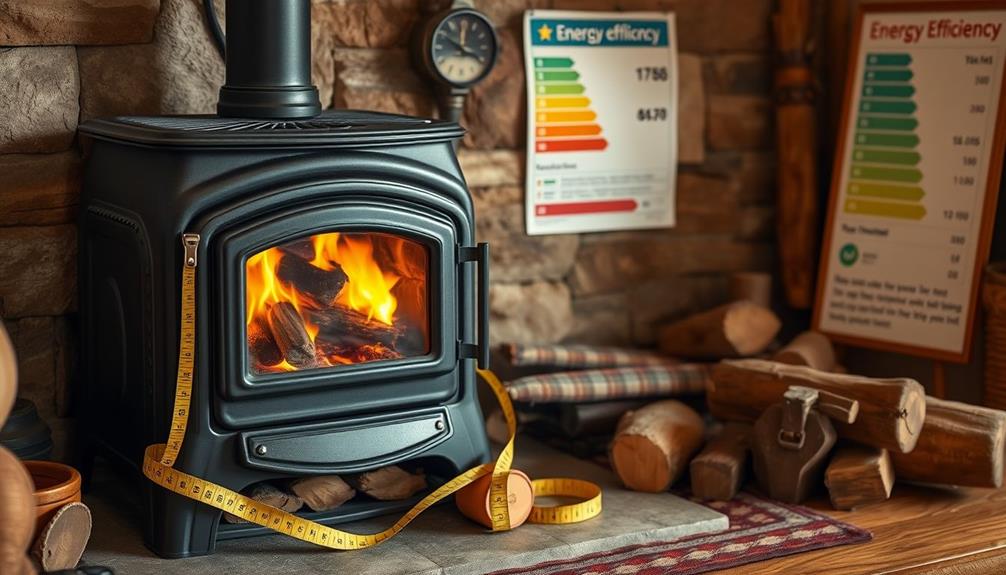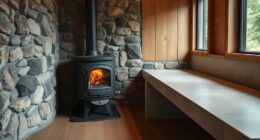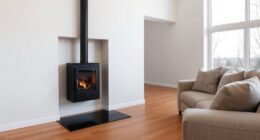When budgeting for a wood stove installation, expect to spend between $1,500 and $4,000, with the average around $3,000. The stove type affects costs—non-catalytic models are cheaper, ranging from $400 to $2,900, while catalytic ones can reach up to $4,400. Don't overlook chimney installation, which can add another $300 to $3,500, plus labor fees between $250 and $800. Be sure to factor in permits and ongoing maintenance costs. Planning ahead can save you money, and you'll find even more tips for managing these expenses as you explore further.
Key Takeaways
- Average wood stove installation costs range from $1,500 to $4,000, with most homeowners spending around $3,000.
- Basic wood-burning stoves cost between $500 and $1,000, while catalytic models range from $1,700 to $4,400.
- Labor costs for installation typically range from $250 to $800, influenced by location and complexity.
- Ongoing expenses, including permits and annual chimney cleaning, generally cost between $150 and $375.
- Proper budgeting should include fuel costs, maintenance, and unexpected repairs, with firewood prices varying widely based on local availability.
Overview of Wood Stove Costs
When considering a wood stove installation, you can expect to spend between $1,500 and $4,000 on average, with most homeowners landing around the $3,000 mark.
The wood stove cost itself varies widely, with basic wood-burning stoves priced between $500 and $1,000, while more efficient catalytic models can range from $1,700 to $4,400. For example, the BTU rating of the Englander 10-Cpm provides a high-efficiency option suitable for larger spaces.
Installation costs can add considerably to your budget, particularly if you require chimney installation. This typically adds between $300 and $3,500, depending on the complexity and materials used.
You'll also need to factor in labor costs, which generally range from $250 to $800, influenced by your geographic location and the intricacy of the installation process.
Don't forget about additional expenses that can arise, such as permits and ongoing maintenance. Regular annual chimney cleaning is essential to guarantee safety and efficiency, costing between $150 to $375.
Key Cost Factors
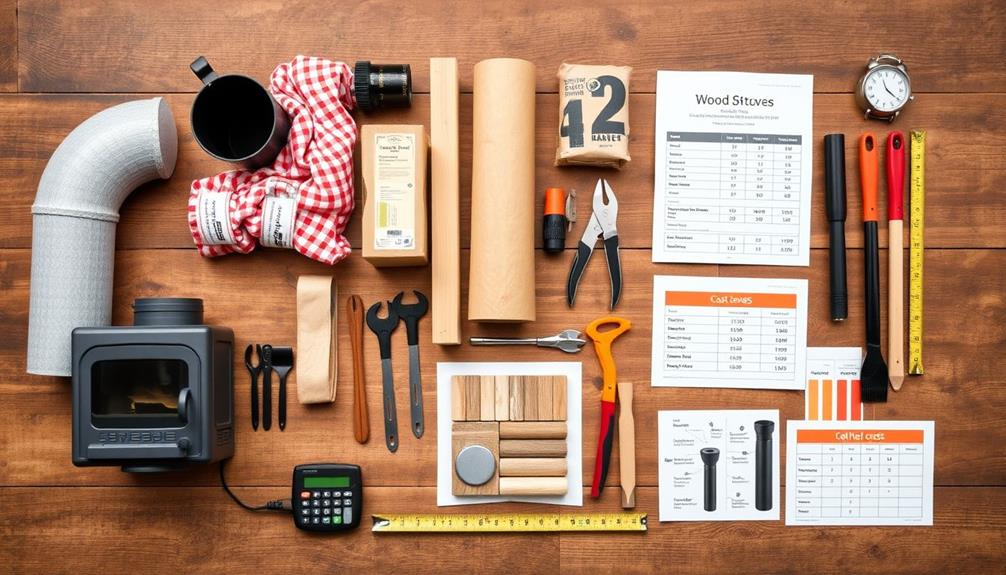
When contemplating wood stove installation, you'll need to account for several key cost factors.
The type of stove you choose, along with labor and materials, can greatly influence your budget.
Additionally, if you plan to hire a professional, it's wise to evaluate the reputation and reviews from past clients to guarantee quality service.
Don't forget to factor in permits and regulations that may apply in your area.
Stove Type Selection
Choosing the right wood stove type is essential, as it greatly impacts both your upfront costs and long-term efficiency. When considering stove type selection, you need to weigh various factors, including wood stove prices, installation costs, and the type of fuel you plan to use.
Additionally, incorporating mindful practices, similar to mindful eating practices, can enhance your overall experience and satisfaction with your heating solution.
Here are some key considerations:
- Catalytic wood stoves: Price ranges between $1,700 and $4,400, offering higher thermal efficiency.
- Non-catalytic wood stoves: More affordable options priced between $400 and $2,900.
- Freestanding vs. Inserts: Freestanding wood stoves cost $1,600 to $3,500, while inserts range from $1,200 to $3,400.
- Material choice: Cast iron stoves range from $350 to $5,000, while steel stoves cost between $700 and $3,200.
Selecting high-efficiency wood stoves can lead to substantial long-term savings on heating costs, as these stoves are about one-third more efficient than older models.
Labor and Materials
Understanding the costs associated with labor and materials is vital for a successful wood stove installation. Labor costs typically range from $250 to $800, and these figures can vary based on your geographic location and the complexity of the installation.
When you factor in materials, such as chimney components, you'll find that costs can average around $100 per foot. For a complete chimney installation of about 18 feet, expect to pay roughly $1,800.
In addition, maintaining good indoor air quality is essential, especially if you're using a wood stove, as it can contribute to air pollution indoors. Consider using an air purifier to help mitigate allergens and particles that may arise from wood burning, thereby improving your home's air quality improving indoor air quality.
Installation expenses can fluctuate considerably depending on the type of stove you choose. Basic wood-burning stoves may set you back between $500 to $1,000, while catalytic stoves could cost anywhere from $1,500 to $4,400.
Additionally, proper sealing of chimney components is essential, and installation costs for ventilation systems or chimney setups can range from $300 to $3,500, depending on the project's complexity.
Don't forget about permit costs, which usually lie between $50 and $250. Always confirm these details with your installer to make sure you're fully prepared for the overall cost of installing your wood stove.
Permits and Regulations
Before you start your wood stove installation, it's important to contemplate the necessary permits and regulations that could affect your project costs.
Permit costs typically range from $50 to $250, depending on local regulations. Confirming these details with your installer guarantees compliance with building codes, which can save you from potential fines down the road.
Additionally, understanding the emotional dynamics involved in home improvement projects—much like the push-pull dynamics seen in relationships with individuals with BPD—can help in managing stress during the installation process.
Additionally, installation may require inspections, adding more to your overall expense. Failing to obtain the necessary permits can complicate insurance claims if something goes wrong.
Here are a few key points to keep in mind:
- Research specific regulations regarding the type of stove you plan to install.
- Factor in installation inspections, which can vary by jurisdiction.
- Always verify local regulations to avoid unexpected costs.
- Guarantee compliance with all required permits to protect your investment.
Professional Vs. DIY Installation
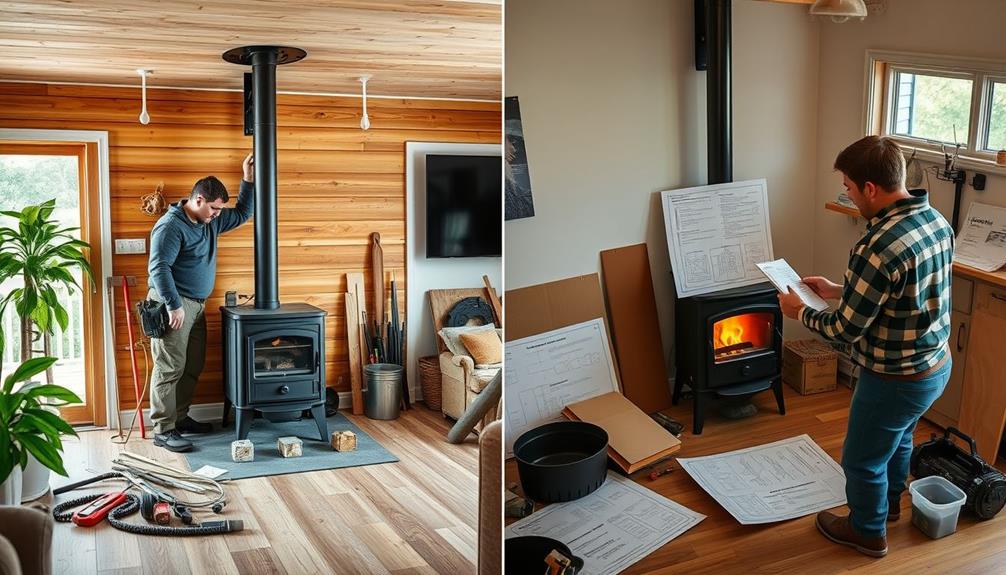
Weighing the benefits of professional versus DIY wood stove installation can greatly impact both your budget and safety. Hiring a professional typically costs between $1,500 and $4,500, which guarantees compliance with local codes and safety standards. On the other hand, DIY installation may save you up to $4,000 initially, but improper setup can lead to fire hazards and carbon monoxide poisoning.
Here's a quick comparison:
| Installation Type | Pros | Cons |
|---|---|---|
| Professional | – Compliance with local codes | – Higher wood stove installation cost |
| – Warranties on work | – Labor costs ($250 to $800) | |
| – Expertise from certified installers | ||
| DIY | – Potentially lower initial costs | – Risk of improper setup |
| – No warranties, higher long-term risks |
Consulting with certified installers can guide you through obtaining necessary permits, usually costing between $50 and $250. Ultimately, investing in professional installation can provide peace of mind, while DIY installation carries significant risks that may not be worth the savings.
Ongoing Operating Expenses
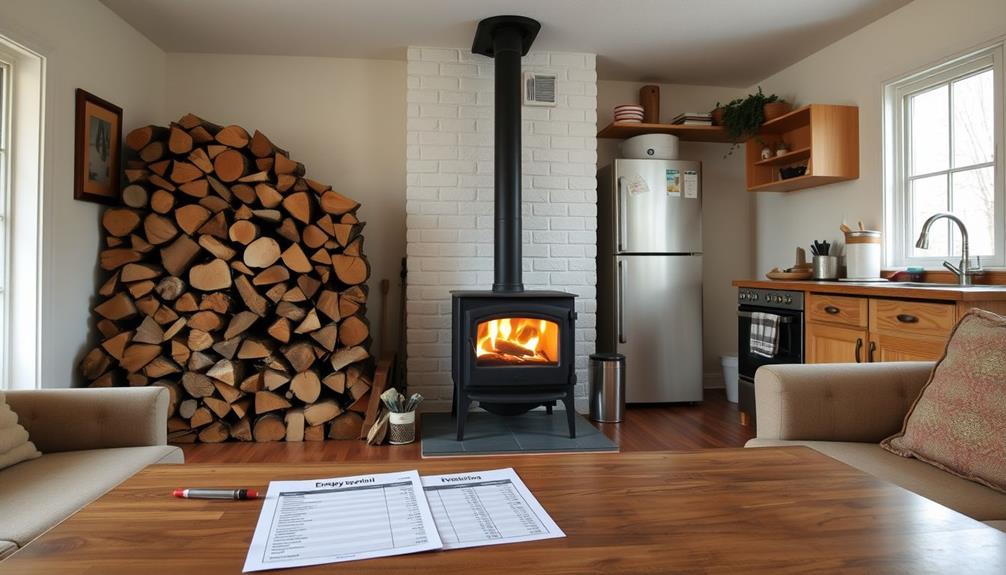
When you use a wood stove, you'll need to take into account ongoing operating expenses like fuel costs, maintenance, and repairs.
Typically, you'll buy wood by the cord, and the price can vary greatly depending on your location and needs. To optimize your budget, it's also wise to evaluate hydration strategies during the winter months, as staying hydrated can help you manage your heating needs more effectively.
Additionally, regular upkeep and unexpected repairs can add to your budget, so it's smart to plan for these seasonal fluctuations.
Fuel Costs Overview
Fuel costs for wood stove heating can vary considerably, impacting your overall budget. Wood is typically sold by the cord, with prices ranging from $120 to $900. Most households require about two cords for winter heating, so it's vital to factor this into your planning.
Additionally, investing in an efficient wood stove can greatly enhance your home security by providing a reliable heat source during outages, similar to how garage door openers enhance home security.
Here are some key points to take into account for your fuel costs:
- Prices depend on local availability: Firewood prices fluctuate based on where you live.
- Efficient wood stoves save money: Using an efficient wood stove can reduce fuel consumption, lowering your overall operating costs.
- Regular maintenance is essential: Budget for maintenance tasks like chimney inspections, averaging around $450, to avoid costly repairs.
- Stock up on firewood supplies: Make sure you have enough firewood on hand to meet your heating needs throughout the winter.
Maintenance and Repairs
Proper maintenance and timely repairs are vital for keeping your wood stove running efficiently and safely. Ongoing maintenance typically averages around $450 annually, but this can vary widely from $100 to $5,000, depending on the condition of your stove and chimney.
To guarantee peak performance, regular chimney inspections are essential, as they help prevent obstructions that can lead to costly repairs ranging from $120 to $360. Additionally, being mindful of what you dispose of in your stove can prevent issues similar to toilet clogging remedies, making sure that it operates smoothly.
Routine tasks like ash removal and chimney cleaning are necessary to maintain safe operation. Neglecting these tasks can lead to bigger issues down the line.
Additionally, keep an eye on your stove's gaskets; faulty gaskets can incur repair costs between $20 and $50 if not addressed promptly.
Seasonal Variability in Expenses
Seasonal expenses for operating a wood stove can vary greatly, especially during the winter months when heating demands peak. Your operating costs will largely depend on factors like fuel expenses and maintenance tasks.
It's important to take into account tax advantages associated with IRAs when planning your budget for home improvements, as investing in energy-efficient appliances may provide potential savings.
Here's what to expect:
- Firewood Costs: You'll typically need two cords for winter, costing between $240 and $1,800.
- Chimney Inspections: Regular checks are essential for safe operation, averaging around $450, but can range notably based on condition.
- Annual Chimney Cleaning: Set aside $150 to $375 to keep your system efficient.
- Repairs: Addressing issues like chimney obstructions can cost $120 to $360.
Investing in modern EPA-certified models can reduce your fuel expenses due to their higher heating capacity and efficiency.
Remember, the installation cost of your wood stove is just the beginning. Ongoing maintenance is key to ensuring your stove operates safely and effectively.
Cost-Saving Strategies
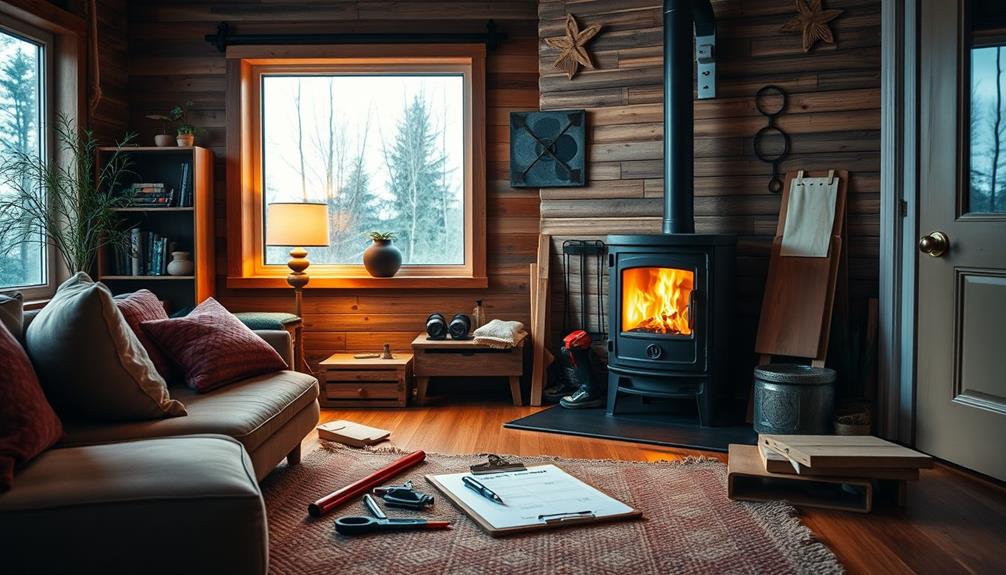
Installing a wood stove can be a notable investment, but there are effective cost-saving strategies that can help you manage expenses.
First, consider scheduling your installation during off-peak seasons, like spring or summer, to secure discounts from contractors. This can help lower the overall cost to install. Additionally, exploring tax benefits associated with Bitcoin IRAs can provide insights into potential savings on other investments.
It's essential to obtain multiple bids from certified wood stove installers, allowing you to compare pricing and services to get the best value for your installation.
Additionally, research available tax credits for high-efficiency wood stoves. These incentives can greatly reduce your purchase costs. Bundling your installation with related projects, such as chimney repairs, can also save you money through combined service fees.
Once your stove is installed, prioritize regular maintenance tasks. Keeping up with maintenance can prevent costly repairs down the line, as average maintenance costs are around $450, while repairs can exceed $5,000.
Safety and Compliance Considerations
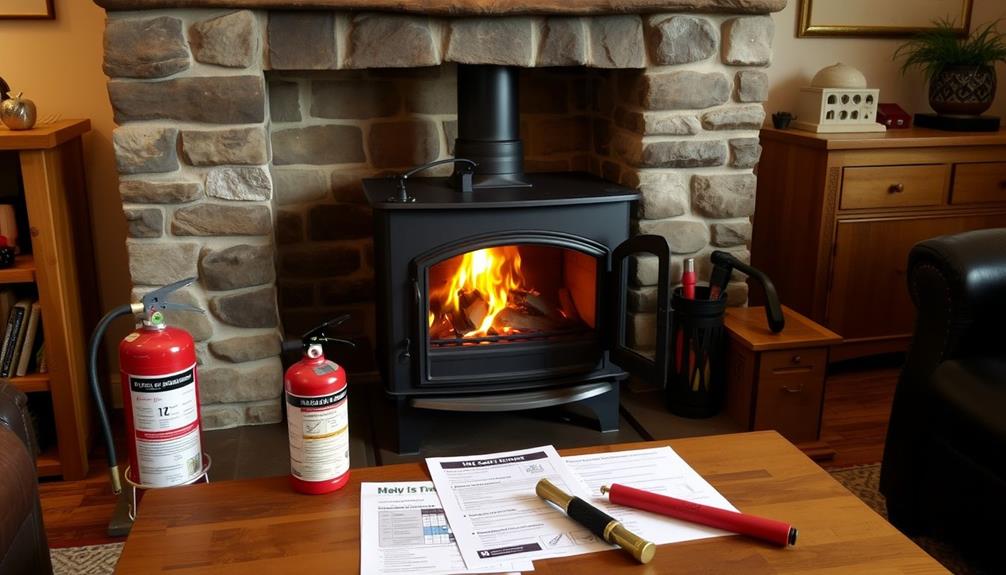
When it comes to wood stove installation, safety and compliance should be top priorities. You'll need to guarantee that your installation meets federal EPA certification standards, which ensures safety and efficiency.
To protect your home and your family, consider these essential safety guidelines:
- Install carbon monoxide detectors in the vicinity of the wood stove.
- Keep combustible materials away from the stove and flue pipe to mitigate fire risks.
- Obtain necessary permits for installation, which usually cost between $50 and $250, to comply with local regulations.
- Hire an NFPA-certified professional to guarantee compliance standards are met.
Failing to adhere to these guidelines can have serious repercussions, including potential issues with insurance coverage.
Many insurance companies require proof of a professional installation, and neglecting this step could affect your coverage and claims in the event of an incident.
By prioritizing safety and compliance, you not only protect your home but also help manage stove installation costs effectively.
Always stay informed about local regulations to avoid unexpected expenses and guarantee a safe heating solution for your home.
Frequently Asked Questions
What Is the Total Cost to Install a Wood Stove?
When considering total costs for installing a wood stove, you'll typically spend between $1,500 and $4,000. Factors like stove type, installation complexity, and additional chimney systems can greatly impact your final expenses.
What Is the Average Cost of Installing a Wood-Burning Stove?
You might think installing a wood-burning stove's too expensive, but the average cost ranges between $3,000 and $4,000. This includes the stove, labor, and necessary materials, ensuring you stay warm and cozy efficiently.
Will My Insurance Go up if I Install a Wood Stove?
Yes, your insurance might go up if you install a wood stove. Insurers assess the added risk, so it's essential you notify them about the installation to guarantee proper coverage and understand potential premium changes.
How Much More Is House Insurance With a Wood Stove?
You might see a 2% increase in your house insurance when you install a wood stove. It's important to notify your provider and guarantee proper installation to avoid complications down the road. Stay informed!
Conclusion
In wrapping up, it's clear that investing in a wood stove can be a cozy choice for your home, but it comes with its own set of considerations. While the upfront costs may seem a bit intimidating, think of them as planting seeds for long-term comfort and savings. By weighing your options and planning carefully, you'll not only warm your space but also guarantee your budget stays in good shape. Happy heating!

